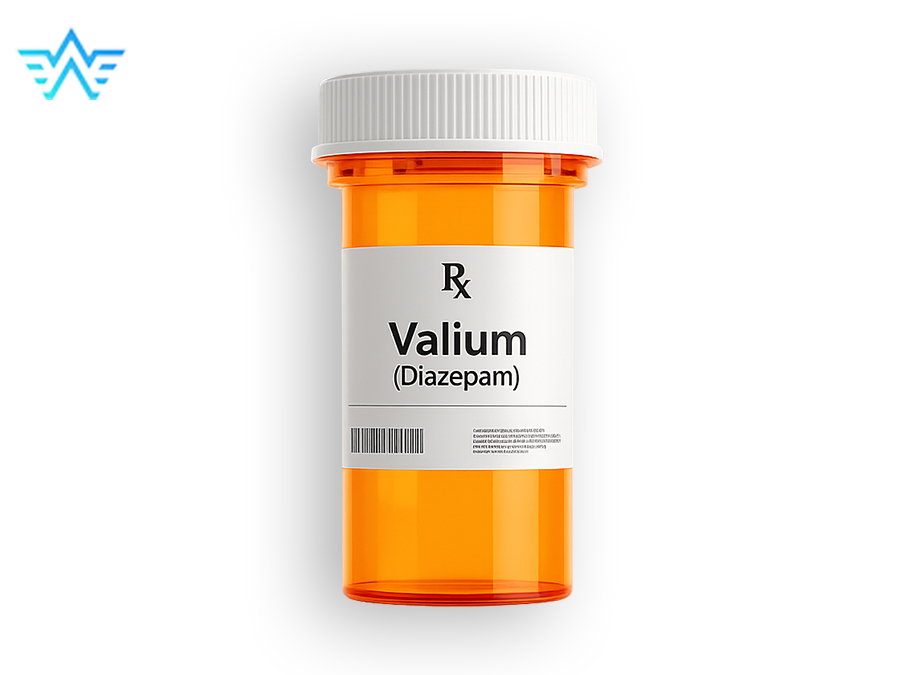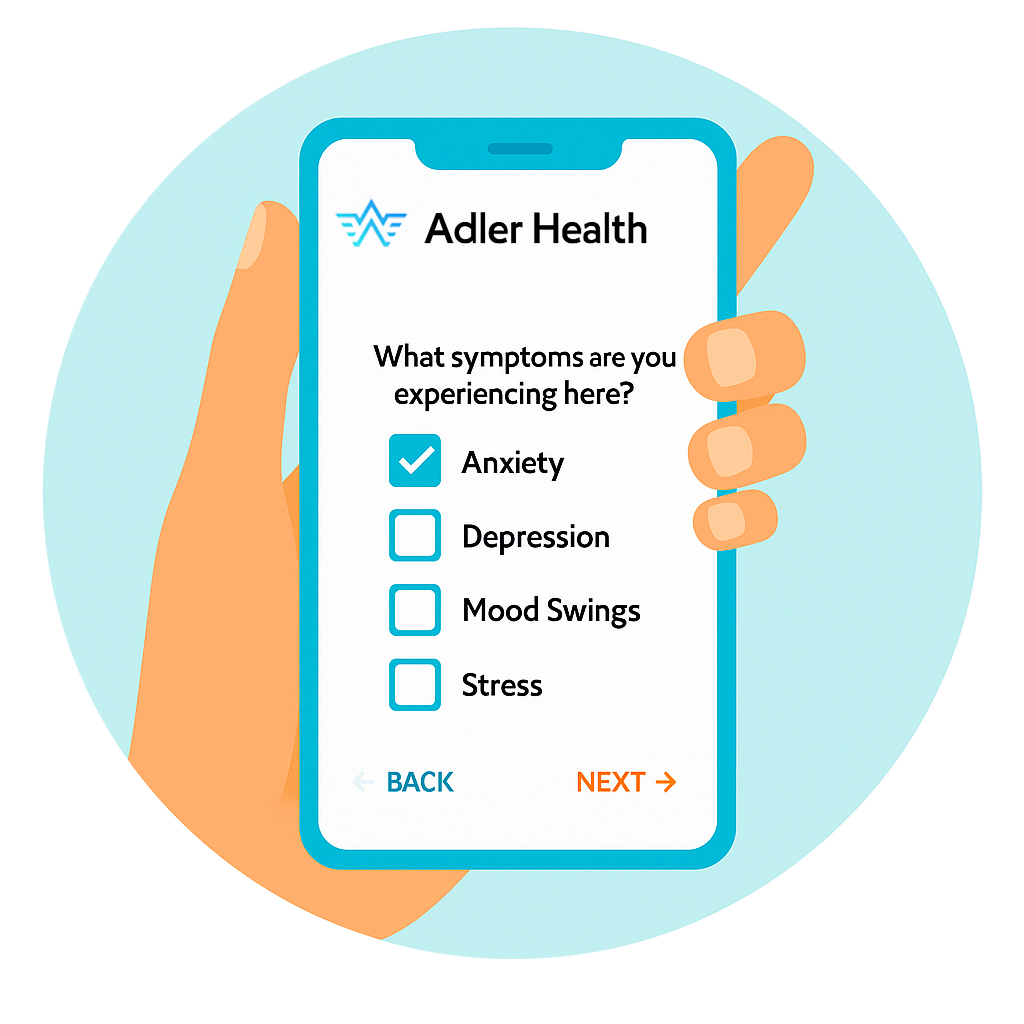Buy Diazepam Online | Experienced Virtual Doctors
Diazepam is a prescription medication that belongs to the benzodiazepine class. It is primarily prescribed and FDA approved for patients who deal with anxiety disorders, muscle spasms, seizures, and alcohol withdrawal symptoms. Diazepam can only be prescribed by qualified mental health experts. Adler Health connects you with experienced professionals who offer free virtual consultations. If needed, they’ll create a treatment plan and issue a prescription.

Starting at $3.50/ pill
Medical Utilization of Diazepam
Diazepam has multiple medical applications. This makes it a versatile medication for patients in miscellaneous treatments. Before considering Valium for your specific condition, consult a medical expert to determine if it is a suitable version. Here is valuable information about several of its primary uses.
Diazepam (Valium) is ordinarily prescribed for generalized anxiety disorder (GAD) and social anxiety. It effectively assists patients in alleviating symptoms such as excessive worry, restlessness, and difficulty concentrating.
Diazepam (Valium) can assist people in relaxing muscles. That’s why the medication can be prescribed for conditions such as cerebral palsy, multiple sclerosis, and spinal cord injuries.After patients employ Diazepam (Valium) for muscle spasms, they can start feeling less pain after 15 minutes.For the muscles to begin to relax, there is a necessity to utilize diazepam on a regular basis for several days.
In cases of alcohol dependence, sudden cessation can drive to severe withdrawal symptoms, specifically tremors, seizures, and anxiety. Diazepam (Valium) is employed to ease withdrawal symptoms and prevent unpleasant complications.
Thanks to its anticonvulsant properties, Diazepam (Valium) can be employed in the governance of seizure disorders, including epilepsy. The remedy is particularly effective in stopping prolonged seizures, known as status epilepticus.
Since Diazepam (Valium) can deliver calming effects, it is frequently administered before surgeries or medical procedures. It assists medical specialists in diminishing patient anxiety and inducing relaxation. For this reason, Diazepam (Valium) is the number one selection for instantaneous light sedation.
How It Works

Quick Health Check
Provide your medical history and describe your symptoms in a short online questionnaire. This helps us understand your situation thoroughly. It only takes 5–10 minutes.

Expert Review by Licensed Providers
Our board-certified mental health providers review your answers and build a treatment plan just for you. You’ll get updates in your patient dashboard.

Prescriptions Shipped to You
Should treatment be necessary, your medication is shipped promptly right to your door in plain, discreet packaging for your privacy.
Therapy, Treatment Services, Prescriptions at Adler Health
Interactions
Diazepam can interact with numerous medications. This may impact its safeness and effectiveness. Definite remedies affect the way diazepam operates and elevate the probability of adverse effects. Before you begin to employ Diazepam (Valium), inform a medical specialist if you are utilizing any of the following medications:
- Central nervous system depressants. Combining Diazepam (Valium) with alcohol, opioids, barbiturates, or other benzodiazepines can trigger excessive sedation, respiratory depression, coma, or even death.
- SSRIs, SNRIs, and tricyclic antidepressants may reinforce sedation and heighten the danger of dizziness and drowsiness.
- Antipsychotics for mental health issues. Such medications as haloperidol or olanzapine can amplify Diazepam’s sedative effects, driving to profound drowsiness.
- Muscle relaxants. Remedies such as baclofen or tizanidine can strengthen Diazepam’s muscle-relaxing effects, which may trigger excessive weakness or coordination troubles.
- First-generation antihistamines (like chlorphenamine and promethazine) can reinforce drowsiness when employed with Diazepam (Valium).
- Proton pump inhibitors (PPIs). Omeprazole and similar medications can slow the breakdown of diazepam, prolonging its effects.
- HIV medications. Ritonavir, saquinavir, and other protease inhibitors can heighten Diazepam (Valium) levels, intensifying its sedative effects.
What’s more, Diazepam (Valium) can interact with anticonvulsants, hypnotics, strong painkillers, and antifungal medications. Since the enumeration of potential interactions is long, it is critical to let your physician know about all the remedies you are currently employing.
Combining Diazepam (Valium) with alcohol can drive to dangerous sedation, slowed breathing, and an elevated probability of overdose. Grapefruit and its juice inhibit enzymes that metabolize diazepam. This can drive to prolonged effects and potential toxicity. Excessive caffeine intake may decline Diazepam’s calming effects, leading to diminished effectiveness.
Dosage and Administration
Diazepam (Valium) is accessible in miscellaneous forms, including oral tablets, liquid solutions, and injectable formulations. It is of utmost significance to employ the medication as the specialist indicates. Dosage varies based on the condition being treated:
- For anxiety: the recommended dose is 2 mg, employed 3 times a day (a dose can be elevated to 5 mg to 10 mg, utilized 3 times a day).
- For muscle spasms in adults: the ideal dose is 2 mg to 15 mg a day. The medication can be employed as 1 mg twice a day and may go up to 5 mg utilized 3 times a day. The dosage may be elevated to up to 20mg, employed 3 times a day if required.
- For sleep issues: the advisable dose is 5 mg to 15 mg, employed once a day at bedtime.
- For muscle spasms in children (1 month to 17 years old): the perfect dose varies hanging on age. The remedy is ordinarily employed twice a day, with 10 to 12 hours between every intake.
If patients are over 65 years old, the dose may be declined. The medical expert will determine the ideal dose of Diazepam (Valium) for you. Employ diazepam tablets or liquids with a glass of water. The remedy can be utilized with or without food.
If patients are employing Diazepam (Valium) as a liquid, the medication can be purchased with a plastic syringe or spoon. With it, patients will be able to gauge the correct dose. If there is no syringe or spoon, request it from your medical specialist. Avoid employing a kitchen teaspoon since it will not gauge the needed amount.
The duration of treatment with Diazepam (Valium) depends on the reasons patients employ it. As a rule, the medication is advisable for a short period of time. Medical experts may instruct to utilize this remedy for up to 4 weeks. If patients are prescribed diazepam for over 4 weeks, the dose may be declined gradually to bypass withdrawal symptoms.
If patients are employing Diazepam (Valium) on a regular basis and forget about a dose, there is a necessity to utilize the missed dose as soon as they remember, unless the time for the next dose is near. In this situation, it is better to skip the missed dose and employ the next dose at the ordinary time.
Avoid employing two doses simultaneously. Do not utilize a supplementary dose to compensate for a forgotten one.If patients frequently forget to employ doses, setting an alarm as a reminder can be helpful. Another variant is to ask the medical specialist for other effective approaches to remember to employ the medication.
Contraindications
The majority of adults who are over 18 years old can employ Diazepam (Valium) tablets and liquid. Those who are over 65 years old may need to utilize a lower dose. Children who are over 1 month old can employ the medication for muscle spasms.
Pay attention that diazepam is not suitable for every patient. Its utilization is contraindicated in definite conditions due to potential health risks. To ensure Diazepam (Valium) is secure for you, inform the medical expert if you have the following conditions:
- Hypersensitivity to diazepam or benzodiazepines. Patients with a known allergy to diazepam or related medications need to avoid Diazepam (Valium).
- Sleep apnea syndrome. The remedy can worsen apnea episodes, driving to serious breathing troubles.
- Severe hepatic impairment. Liver dysfunction can prolong medication metabolism, elevating toxicity risk.Psychomotor tests are carried out to identify patients with liver cirrhosis who are at greater risk of excessive sedation after diazepam administration.
- Myasthenia gravis. Diazepam (Valium) can exacerbate muscle weakness in patients with this neuromuscular disorder.
- Depression and suicidal tendencies. The remedy can worsen depressive symptoms and heighten suicidal probability.
- History of substance abuse. Due to its potential for dependence, Diazepam (Valium) should be employed cautiously in individuals with a history of addiction.
- Older adults. Patients who are over 65 years old are more sensitive to sedation and cognitive impairment, elevating the danger of falls.
Before employing Diazepam (Valium), healthcare providers must estimate the patient’s medical history to bypass complications. People with contraindicated conditions should seek alternative treatment approaches to prevent serious side effects.
Probability of Diazepam Overdose
Unfortunately, misuse or excessive intake of Diazepam (Valium) can drive to an overdose. This condition can be threatening to life. A diazepam overdose occurs when someone employs too much of the medication, driving to severe central nervous system (CNS) depression.
For instance, this can happen due to accidental overuse. This implies employing higher doses than prescribed. Another reason is intentional overdose. This signifies misuse of Diazepam (Valium) for recreational effects or self-harm.
What’s more, overdose may occur because of mixing diazepam with other substances. In particular, combining the medication with alcohol, opioids, or other depressants elevates overdose probability. Finally, definite medical conditions can drive to an overdose. Liver disease or kidney impairment can slow the medication’s metabolism, resulting in its accumulation in the body.
Overdose manifestations depend on the amount employed and whether other substances are involved. Contact the medical professional if you notice alterations in your healthiness. The most widespread symptoms of Diazepam (Valium) overdose include:
- Extreme drowsiness or sedation
- Confusion and impaired coordination
- Slurred speech
- Weakness or dizziness
- Blurred vision
- Feeling overexcited
- A slow or irregular heartbeat
Since Diazepam (Valium) overdose is dangerous, it should not be ignored. This condition can drive to respiratory failure, loss of consciousness, coma, brain damage due to lack of oxygen, and heart complications such as slowed heart rate.
If a Diazepam (Valium) overdose is suspected, immediate medical help is a must. There are several treatment variants accessible. Call emergency services or seek medical attention as rapidly as possible. Supportive care may be required. IV fluids, oxygen therapy, and assisted breathing can be applied if necessary. Hospitalization may be needed for severe cases. Luckily, with rapid medical intervention, recovery is possible.
Keep in mind that Diazepam (Valium) overdose can be deadly. To bypass diazepam overdose, employ the medication strictly as prescribed. Do not mix the remedy with alcohol or other depressants. Store Diazepam (Valium) safely to prevent accidental ingestion. Ask for assistance for substance misuse if needed.
Side Effects
Diazepam (Valium) is a well-tolerated medication for the majority of patients. Nonetheless, it can still trigger a range of side effects. They are divided into mild, moderate, or severe. Mild side effects are common but temporary:
- Drowsiness
- Fatigue
- Dizziness
- Dry mouth
- Mild headache
Moderate side effects are serious and may happen less frequently than mild ones. If they are persistent, medical attention may be required. Ask for professional help if you encounter the following manifestations:
- Confusion or difficulty concentrating
- Mood alterations (irritability and depression)
- Slurred speech
- Trouble with coordination and balance
- Shaky hands (tremors)
Severe side effects represent the most dangerous complications. If they occur, there is a necessity to seek immediate medical help. Reach emergency services or talk to your physician if you face such symptoms as:
- Severe drowsiness or sedation
- Jaundice (yellowing of skin or eyes)
- Hallucinations or severe mood swings
- Constant falls
- Delusions (thinking about things that are not real)
The enumeration of mild, moderate, or severe side effects may not be complete. Familiarize yourself with a full list of adverse effects inside the medication packet. Employ the remedy under medical supervision and report any unpleasant effects to a professional.
Let Adler Health Serve You!
If you or a loved one is struggling with a mental health disorder or a co-occurring disorder, Adler Health is here for you. Contact us today to learn more about our mental health treatment programs and other resources.




